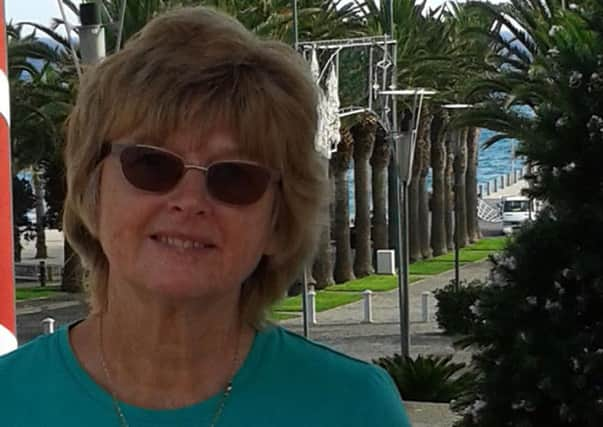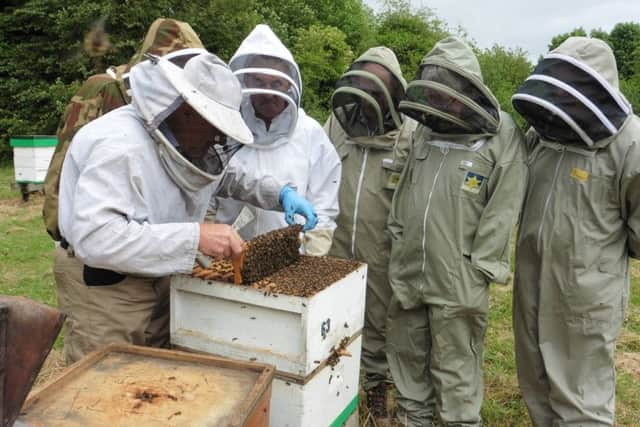Honey bee health initiative


The Ulster Beekeeping Association (UBKA) is undertaking a major initiative to improve the ability of local beekeepers to recognize and deal with both notifiable and other brood diseases and also Varroa, Nosema and Acarine.
American Foulbrood (AFB) and European Foulbrood (EFB) are notifiable brood diseases and beekeepers detecting either of these conditions are required to inform DARD. Confirmed cases result in destruction of the affected colonies.
Advertisement
Hide AdAdvertisement
Hide AdIn addition, monitoring the Varroa parasite and managing its level through integrated pest management requires constant vigilance on the part of beekeepers. If left untreated, Varroa will lead to collapse of the colony.


Nosema and acarine are further endemic pathogens which weaken colony strength but which on their own are less of a threat than AFB, EFB and Varroa.
During 2015 outbreaks of AFB and EFB were confirmed at approximately 40 apiaries throughout Northern Ireland and beekeepers are being urged to be vigilant in 2016 to limit the spread of these infectious diseases.
AFB and EFB can be spread by bees themselves but also by beekeepers and this can be mitigated by good practice.
Advertisement
Hide AdAdvertisement
Hide AdAs with all stock management, the most important factors are good hygiene and biosecurity, the ability to recognize the signs of disease, reporting suspected outbreaks to the authorities and following agreed practice when infections do occur.


Beekeepers are encouraged to ensure good hygiene when moving from colony to colony and between apiaries, to be on their guard when acquiring new colonies, hive parts or equipment, to prevent drifting of bees from colony to colony, or robbing of weak colonies by stronger colonies and to quarantine swarms from unknown sources.
Advisory workshops, free of charge and open to all beekeepers, are being organized by the UBKA in February 2016 at locations throughout Northern Ireland to make beekeepers aware of practical measures to prevent, recognise and deal with outbreaks of AFB, EFB and other diseases.
These workshops will be led by former Regional Bee Inspector for southern England, Ian Homer and his wife Ruth who together run Bride Valley Apiaries, Dorchester, Dorset. The workshops are titled “Managing Honeybees for a Healthy Outcome”.
Advertisement
Hide AdAdvertisement
Hide AdRefreshments will be provided at the workshops and dates and locations are:


20th February. Lagan Valley Island, Lisburn 1.00pm – 4.30pm.
21st February The White Horse Inn, Campsie, Londonderry 1.00pm – 4.30pm).
22nd February Westville Hotel, Enniskillen 7.00pm – 10.00pm.
Advertisement
Hide AdAdvertisement
Hide AdRuth and Ian Homer have kept bees for 35 years in Dorset and in Northumberland, having, on average, around 12 colonies. Ian joined the National Bee Unit (NBU) in 1999 and was a seasonal bee inspector in Northumberland, Tyne & Wear and Co. Durham and then in Devon before becoming Regional Bee Inspector for Southern England and then Extension and Learning Officer, retiring from the NBU in July 2011. Ruth has been active as Secretary, Treasurer, Chair and Newsletter Editor for associations in Northumberland and Dorset. For five years she was the Workshop Convenor for the British Beekeeping Association Spring Convention. They encourage beekeepers to practice good bee husbandry and present beekeeping issues in a practical and straightforward way. Following the workshops in Lisburn, Londonderry and Enniskillen, Ian and Ruth will travel south to deliver workshops in Dublin, Wexford, Cork and Limerick. Details of these events may be obtained from the Federation of Irish beekeeping Associations (FIBKA)